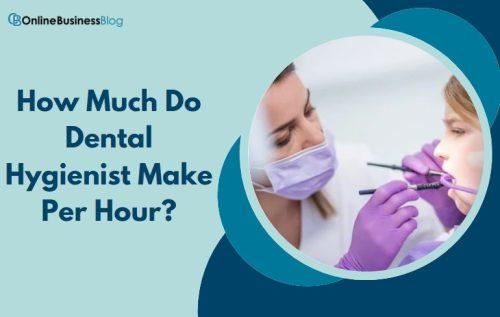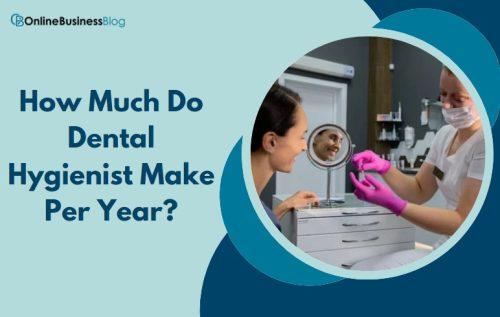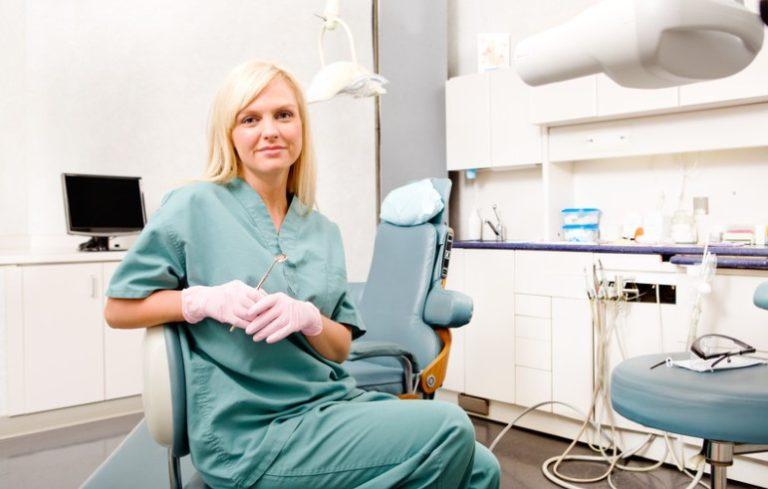Post Contents
Discover the sparkling world of dental hygiene and explore the rewarding career of a dental hygienist in the UK! If you have a passion for oral health, enjoy working with people of all ages, and possess excellent manual dexterity, then this might just be the perfect profession for you. Not only will you get to provide essential advice on dental care and help prevent gum disease, but you’ll also play a vital role in promoting healthy smiles across the nation. But along with all that fulfilment comes curiosity about how much dental hygienists actually make in the UK. Well, get ready to uncover the financial side of this dynamic profession as we delve into their average earnings per hour, day, week, month…and year! So let’s dive right in and find out just how lucrative a career as a dental hygienist can be!
Responsibilities as a Dental Hygienist

As a dental hygienist, your responsibilities extend far beyond just cleaning and polishing teeth. You are an invaluable source of dental advice and oral health education for patients of all ages. Working closely with the dental team, you play a crucial role in treating and preventing gum disease.
Using a range of specialized dental instruments, you skillfully clean, polish, and scale teeth to perfection. But it doesn’t stop there! You also apply treatments that help reduce decay and ensure proper sterilization of all dental equipment.
Impressions and radiographs (x-rays) are essential tools in diagnosing and monitoring oral health conditions, so you’ll become well-versed in capturing these images accurately. And if necessary, you even administer local anaesthesia to ensure patient comfort during procedures.
Dental hygienists go above and beyond by applying fissure sealants to protect teeth from cavities. Additionally, they have the skills to apply temporary dressings for broken teeth or lost fillings until further treatment can be provided.
But it’s not just about physical care – educating patients on proper tooth brushing techniques, cleaning between their teeth effectively, and maintaining good oral hygiene habits is part of your daily routine. Your compassionate nature shines through as you put patients at the centre of their care journey.
Collecting medical histories, and documenting dental records meticulously—all while adhering to a professional code of ethics—is second nature to dedicated dental hygienists like yourself. Staying up-to-date with new developments within the profession ensures that your knowledge remains current as advancements continue to shape dentistry.
Whether working directly with patients or following specific instructions from dentists through prescriptions (instructions), newly qualified hygienists gain valuable experience before taking on independent treatment roles. Whether as part of a collaborative dental team or independently practising in clinics or private practices—your contribution is vital in promoting optimal oral health for all!
Working Hours
Working as a dental hygienist can offer a variety of working hours and settings. On average, you can expect to work 37.5 hours per week, from 8:30 AM to 5:00 PM. However, depending on your employer, there may be occasions when you’ll need to work in the evenings or on weekends.
If you choose to work in a hospital setting, your schedule may include being on call during weekends or even working shifts. This flexibility allows dental hygienists to provide care when it’s needed most.
For those working in community dental services, additional flexibility may be required. This could mean travelling between different locations or accommodating patients’ schedules outside of typical office hours.
It’s not uncommon for dental hygienists to work in multiple settings throughout the week. This might involve rotating between different dental practices, hospitals, or community dental services.
The ability to adapt and thrive within various environments is an essential skill for dental hygienists. It allows them to meet the diverse needs of their patients while gaining valuable experience across different healthcare settings.
The varied working hours and settings make being a dental hygienist an exciting career choice that offers flexibility and opportunities for professional growth.
What to Expect?

As a dental hygienist, you’ll have the opportunity to work alongside a team of dedicated dental healthcare professionals. This includes dentists, dental nurses, and even dental therapists. Together, you will provide comprehensive oral care to patients of all ages.
One of the great things about being a dental hygienist is that job opportunities are available throughout the UK. Whether you prefer working in bustling cities or peaceful rural areas, there are positions waiting for qualified individuals like yourself.
When it comes to your daily routine as a dental hygienist, safety is paramount. You’ll be required to wear protective gear such as safety glasses, face masks, and gloves. These precautions ensure both your well-being and that of your patients by minimizing the risk of infectious diseases.
While providing excellent oral care can be rewarding, it’s important to note that some aspects of the job can be physically demanding. The repetitive nature of certain tasks may lead to eye strain and fatigue in your neck and back muscles. However, practising good ergonomics and taking breaks when necessary can help alleviate these issues.
In terms of scheduling, most dental hygienists enjoy regular working hours without having to travel or stay overnight away from home. However, for those with experience under their belts looking for new challenges abroad, there are exciting opportunities available overseas.
Being part of a dedicated team striving towards optimal oral health is truly fulfilling. As a valued member within this field across various locations in the UK or even internationally – wherever you choose – there is no shortage of room for growth and development in your career as a dental hygienist.
Qualifications to Work as a Dental Hygienist
To work as a dental hygienist in the UK, registration with the General Dental Council (GDC) is mandatory. This requires completing one of the GDC-approved qualifications, such as a three-year degree in oral health science, dental hygiene, or dental hygiene and therapy. The University of Edinburgh offers a four-year program for oral health science.
Alternatively, you can pursue a two-year diploma of higher education in dental hygiene (or 27 months if it covers both dental hygiene and therapy) or a two-year foundation degree in oral health science. All these courses are full-time.
For eligibility to enrol in a degree program, you typically need three A-levels including biology or human biology, along with GCSEs in maths and English. Foundation degree applicants usually require two A-levels. In some cases, a nationally recognized dental nursing qualification may substitute for an A-level.
Some institutions also accept graduates with at least a 2:2 grade in a science or healthcare subject. Entry requirements vary between institutions; therefore, it’s advisable to check specific criteria.
Before admission to training programs in England and Wales (or Scotland), successful completion of an Enhanced Disclosure and Barring Service (DBS) check is necessary. Additionally, certain courses may require undergoing university occupational health service checks.
When applying for GDC registration, it’s important to disclose any fitness-to-practise issues that may arise during your application process.
Furthermore, pre-registration dental hygienist students studying eligible courses at levels 5 and 6 can receive non-repayable funding support through the NHS Learning Support Fund (£5k per year).
For further information regarding approved courses by BSDHT or detailed admission requirements from individual institutions should be consulted directly.
Skills You’ll Need to Have

To excel as a dental hygienist, possessing a range of essential skills is crucial. First and foremost, excellent communication and interpersonal skills are paramount. Being able to explain treatments in a calm and reassuring manner while advising patients on maintaining healthy teeth and gums is vital for building trust and ensuring patient compliance.
Furthermore, effective listening skills coupled with the ability to motivate patients are indispensable for educating them about proper oral hygiene practices and maintaining a healthy diet. Collaboration is also key in this profession, as dental hygienists must work well within a team environment while also being capable of independently managing their responsibilities.
Having a caring disposition paired with an innate interest in helping others is fundamental to providing compassionate care across all age groups. Additionally, possessing exceptional manual dexterity alongside confidence in handling dental equipment allows for the precise execution of dental procedures.
The ability to maintain concentration for extended periods ensures that every task is carried out meticulously, leaving no room for error. Furthermore, strong written communication skills enable accurate record-keeping which ensures comprehensive patient care.
Having a friendly yet professional demeanour facilitates effective interactions with both patients and colleagues alike. These qualities collectively contribute towards being successful as a dental hygienist – making it not just an occupation but rather an opportunity to positively impact people’s lives through oral health education and treatment provision.
Employers
Dental hygienists have a variety of employment options available to them in the UK. One common place of work is general dental practices, where most qualified dental hygienists work either full or part-time. In these settings, they provide both NHS and private treatment to patients.
Another option is community dental services, where the focus is on ensuring that everyone has access to dental care. This can involve working in hospitals, specialist health centres, and mobile clinics, as well as making home visits or visiting nursing and care homes.
Dental hospitals also employ dental hygienists who work as part of different teams covering various aspects of dental care. From children’s dentistry to orthodontics and complex treatments like oral surgery.
Private companies in various industries may offer on-site dental care for their employees, providing another avenue for employment for dental hygienists.
For those interested in serving with the military, there are opportunities with defence dental services at locations both within the UK and overseas with the British Army, Royal Air Force, and Royal Navy.
Job vacancies can be found through platforms such as BDJ Jobs, NHS Jobs, and NHS Scotland Recruitment Specialist recruitment agencies like DentalElite also advertise both full-time and part-time positions.
With numerous options available across different sectors of healthcare and industries alike, dental hygienists have a range of choices when it comes to finding employment that suits their preferences and skills.
How Much Do Dental Hygienist Make in the UK?
How Much Do Dental Hygienist Make Per Hour?

Dental hygienists play a crucial role in maintaining oral health and preventing gum disease. But how much do they actually make per hour? On average, dental hygienists in the UK earn money around £34.42 per hour.
This hourly rate reflects their expertise and the important work they do to keep our teeth clean and healthy. Dental hygienists provide advice on dental hygiene care, offer oral health education to patients of all ages, and work closely with dentists to treat and prevent gum disease.
With their excellent communication skills, they explain treatments to patients in a calm and reassuring manner while motivating them to maintain good oral hygiene practices. Their manual dexterity allows them to handle dental instruments with confidence, ensuring precise dental work.
Working as part of a dental healthcare team, dental hygienists may find employment in general dental practices, community dental services, or even defence dental services within the British Armed Forces. They also have opportunities for overseas work.
Being a dental hygienist is not only rewarding but financially satisfying too!
How Much Do Dental Hygienist Make Per Day?
As a dental hygienist, you play a crucial role in maintaining oral health and ensuring that patients have healthy teeth and gums. But what about your own financial health? Let’s take a closer look at how much dental hygienists make per day in the UK.
On average, dental hygienists earn around £354 per day. This figure can vary depending on factors such as experience level, location, and type of employment. It’s important to note that this is just an average, and individual salaries may be higher or lower based on various circumstances.
The salary range for dental hygienists can be quite broad, starting from around £200 per day for entry-level positions and going up to over £500 per day for those with extensive experience or working in high-demand areas.
It’s worth mentioning that many dental hygienists work part-time or on a freelance basis, which allows them flexibility in their schedules but may also impact their daily earnings. Additionally, benefits such as healthcare coverage or retirement plans can also influence overall compensation.
Being a dental hygienist can offer both professional fulfilment and financial stability. With competitive daily rates and opportunities for growth within the field, it’s clear why many individuals choose this career path.
How Much Do Dental Hygienist Make Per Week?

Dental hygienists play a vital role in maintaining oral health and keeping our pearly whites sparkling. But how much do they earn for their hard work? On average, dental hygienists in the UK make around £1,048 per week.
Now you might be wondering what factors contribute to this earning potential. Well, several elements come into play when determining a dental hygienist’s salary. Experience is undoubtedly one of them. The more years of practice under their belt, the higher the pay scale tends to be.
Another factor is location. Salaries can vary depending on whether you work in a bustling city or a rural area. Urban areas usually offer higher wages due to increased demand and cost of living.
Furthermore, the type of employer can influence earnings as well. Dental hygienists working in private practices may have different compensation structures compared to those employed by community dental services or hospitals.
Additionally, additional qualifications and specialized skills can also lead to higher pay rates for dental hygienists who have achieved advanced certifications or added specialities such as pediatric dentistry or orthodontics to their repertoire.
Remember that these figures are just averages and individual salaries may vary based on specific circumstances such as part-time versus full-time employment or other unique factors that impact earning potential. So if you’re considering a career as a dental hygienist, keep these aspects in mind while planning your professional journey!
How Much Do Dental Hygienist Make Per Month?
Dental hygienists play a vital role in maintaining oral health and preventing gum diseases. But aside from their valuable contributions to dental care, have you ever wondered how much they earn? In the UK, the average monthly salary for a dental hygienist is around £4,054.
With their extensive training and expertise, dental hygienists command a competitive wage that reflects their skill set. This income is well-deserved considering the responsibilities they undertake on a daily basis. From providing dental advice and education to patients of all ages to using specialized instruments for teeth cleaning and polishing, dental hygienists are committed to ensuring optimal oral hygiene.
Their dedication doesn’t stop there; they also apply treatments to reduce decay, take impressions and radiographs (x-rays), give local anaesthesia when necessary, and even apply fissure sealants to protect teeth. Additionally, they sterilize equipment diligently and keep accurate patient records.
The demand for dental hygienists remains high across various settings such as general practices or community dental services. Their work hours can be flexible depending on employer requirements – whether it’s working in multiple locations during the week or occasionally being on call during weekends.
The earning potential for dental hygienists in the UK is promising. With continuous professional development opportunities available within the field, these dedicated professionals can expect steady career growth along with financial stability.
How Much Do Dental Hygienist Make Per Year?

One of the key factors that many individuals consider when choosing a career is the potential earning capacity. In the case of dental hygienists in the UK, the average annual salary is an impressive £57,252. This figure reflects both the demand for dental hygiene services and the level of skill and expertise required to excel in this field.
As dental hygienists play a crucial role in preventive oral healthcare, their contributions are highly valued by patients and dental practices alike. Their responsibilities encompass providing advice on oral hygiene care, treating gum disease, applying treatments to reduce decay, and educating patients on maintaining good oral health.
The competitive salary range for dental hygienists is not only reflective of their skills but also takes into account their qualifications. To work as a dental hygienist in the UK, registration with the General Dental Council (GDC) is mandatory. This requires completion of an approved qualification such as a three-year degree or two-year diploma in oral health science or dental hygiene.
With opportunities available throughout various settings including general practices, community services, hospitals, private companies, and defence service locations like army bases or naval ships overseas – there are ample prospects for career growth and development within this profession.
Overall, dental hygienists can enjoy not only financial stability but also job satisfaction knowing that they make a significant impact on improving people’s oral health. With a dedicated focus and continuous advancement within their field, this profession offers great potential for personal growth along with attractive remuneration packages
Conclusion
To sum it up, dental hygienists play a crucial role in maintaining oral health and promoting good dental hygiene practices. They work closely with dentists and other members of the dental team to provide comprehensive care to patients of all ages.
In terms of salary, dental hygienists in the UK can expect to make money with an average hourly rate of £34.42, which amounts to approximately £57,252 per year. This varies depending on factors such as experience, location, and type of employment.
The responsibilities of a dental hygienist are diverse and encompass various tasks such as educating patients about oral health, cleaning teeth using specialized instruments, applying treatments to prevent decay, taking x-rays and impressions when necessary, and ensuring proper sterilization of equipment.
Dental hygienists typically work 37.5 hours per week during regular office hours but may also need to be flexible depending on their employer or setting. Though eye strain and fatigue can be potential challenges due to the repetitive nature of some tasks, the reward lies in helping patients achieve optimal oral health.
To become a registered dental hygienist in the UK, one must complete an approved qualification recognized by the General Dental Council (GDC). These include three-year degrees or two-year diplomas/foundation degrees focusing on oral health science or dental hygiene/therapy. Eligibility criteria vary among institutions but generally require A-levels or equivalent qualifications in relevant subjects like biology or human biology.
Dental hygienists find employment opportunities across various settings including general dental practices (NHS or private), community services ensuring access for all individuals, and hospitals covering different aspects of dental care from children’s dentistry to complex treatments & surgery. There are even options for working overseas for those seeking international experience.
Becoming a dental hygienist offers not only rewarding career prospects but also provides an opportunity to make a positive impact on people’s lives through preventive oral healthcare education and treatment. With a competitive salary and the ability to work in different settings, dental


